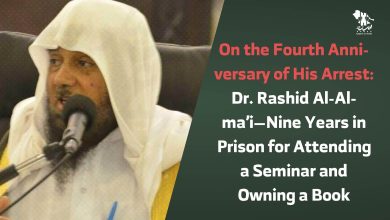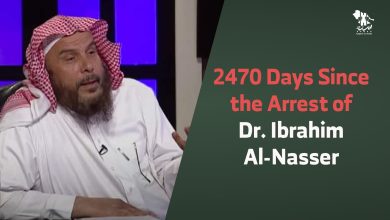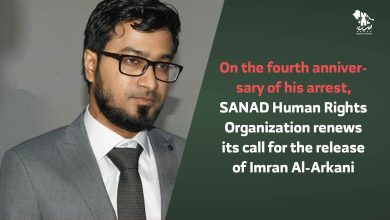
Human Rights Watch Condemns 20-Year Prison Sentence for Saudi Teacher Asaad Al-Ghamdi, Describes It as Transnational Repression
Human Rights Watch Condemns 20-Year Prison Sentence for Saudi Teacher Asaad Al-Ghamdi, Describes It as Transnational Repression


Human Rights Watch issued a statement today condemning the 20-year prison sentence given to Saudi teacher Asaad Al-Ghamdi. The organization considers this conviction a new example of transnational repression in Saudi Arabia, pointing out that the sentence was due to the activities of one of his family members abroad, Dr. Saeed Al-Ghamdi, a Saudi dissident living in London. Human Rights Watch affirmed that this ruling represents a new escalation in the ongoing crackdown on freedom of expression and other fundamental rights in Saudi Arabia.
On May 29, 2024, the Specialized Criminal Court in Saudi Arabia, an anti-terrorism court, convicted 47-year-old Saudi teacher Asaad Al-Ghamdi of several crimes related to his peaceful online expression. Al-Ghamdi was arrested on November 20, 2022, in a night raid at his home in the Al-Hamdaneya neighborhood of Jeddah in front of his wife and children. Security forces confiscated electronic devices and ransacked every room in the house without informing him of the reasons for his arrest or the charges against him.

It is noteworthy that Asaad Al-Ghamdi is the brother of Mohammed Al-Ghamdi, a retired Saudi teacher sentenced to death in July 2023 based on his posts on X (formerly known as Twitter) and his activity on YouTube. Their third brother, Saeed bin Nasser Al-Ghamdi, is a well-known Islamic scholar and government critic living in exile in the United Kingdom. Saudi authorities often retaliate against family members of critics and dissidents abroad in an attempt to force them to return to the country, according to Human Rights Watch.
Human Rights Watch added that authorities detained Asaad Al-Ghamdi in Dhahban Prison in Jeddah, initially in solitary confinement for three months, and he was held incommunicado for nearly two months. Al-Ghamdi did not receive his first visit from his family until January 11, 2023. Court documents reviewed by Human Rights Watch indicate that authorities charged Asaad Al-Ghamdi under Articles 30, 34, 43, and 44 of the Saudi Anti-Terrorism Law, the same articles used in July 2023 to sentence his brother Mohammed Al-Ghamdi to death. The documents show that Asaad Al-Ghamdi was accused of “disparaging the religion and justice of the King and Crown Prince” and “spreading false news and rumors.” The documents state that Al-Ghamdi was arrested “for posting content harmful to national security on social media (Twitter).”

Sources informed Human Rights Watch that the tweets used as evidence against him criticized projects related to Vision 2030, Crown Prince Mohammed bin Salman’s program to diversify the country’s economy, as well as recent changes in the Saudi government, noting the “abandonment of the old religious alliance.” In one of his tweets, Al-Ghamdi mourned Dr. Abdullah Al-Hamid, a founder of the Saudi Civil and Political Rights Association (HASM) who died in prison after being convicted on charges related to his peaceful human rights activism, and offered condolences to his family.
The documents cited Al-Ghamdi’s posts on X as evidence against him, demanding the maximum penalty for each article he was accused of. The prosecution also sought the confiscation of Al-Ghamdi’s laptop and the closure of his X account.
Human Rights Watch stated that Saudi authorities held the first trial session for Al-Ghamdi on September 7, 2023, in Riyadh, informing him of the charges afterward. In late August, the court appointed a lawyer who later refused to provide Al-Ghamdi or his family with any legal documents related to the case. The lawyer met Al-Ghamdi only in court during trial sessions and did not travel to Jeddah to meet him outside court sessions, often refusing to meet his family or share relevant information about the case.
Informed sources added that the lawyer declined to present evidence of Al-Ghamdi’s health condition in court despite his family’s insistence, believing it might be a useful defense. Al-Ghamdi suffers from epilepsy, requiring ongoing medical care, which he has not received during his detention. In one incident, Al-Ghamdi remained unconscious in the bathroom for hours, suffering a seizure, falling, and breaking his finger and a tooth. He only received basic medical attention from a general practitioner in prison rather than the specialist care he needed.
Sources expressed concern to Human Rights Watch about Asaad’s brother, Mohammed Al-Ghamdi, sentenced to death for his peaceful social media activity. Mohammed also suffers from epilepsy, and his health has significantly deteriorated in detention. Sources reported that prison authorities ignored Mohammed’s repeated requests to see a doctor or visit a hospital until his pain became unbearable. When the authorities finally allowed him to see a doctor, the general practitioner did not provide any medication.
Human Rights Watch urged Saudi authorities to provide immediate medical care to Asaad and Mohammed Al-Ghamdi, including access to specialists capable of treating their health conditions and providing appropriate medications. Human Rights Watch has repeatedly criticized widespread abuses in Saudi Arabia’s criminal justice system, including prolonged detention without charge or trial, denial of legal assistance, and reliance on confessions extracted under torture as a basis for conviction.

In this context, Joy Shea, a researcher on Saudi Arabia at Human Rights Watch, said, “Saudi courts are issuing decades-long prison sentences to ordinary citizens simply for peacefully expressing themselves online. The government should also stop punishing the families of critics living abroad.”
Shea described the sentence as appalling, saying, “This decades-long sentence proves that Saudi authorities are willing to crush any dissent. Saudi Arabia’s allies should condemn these sentences and demand the release of prisoners and an end to repressive practices.” Human Rights Watch also quoted Dr. Saeed Al-Ghamdi, Asaad’s brother, saying, “The invalid sentence aims to harass me personally after failed attempts by the authorities to force my return to the country.”






